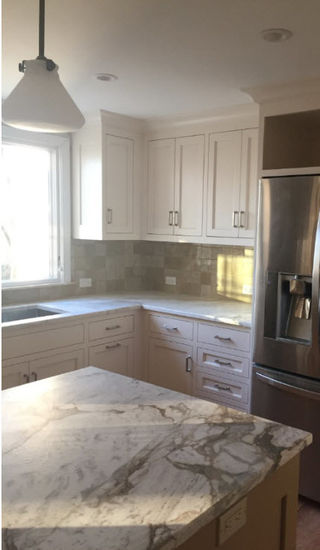Anxiety
Renovation and Couples Conflict
Four common conflicts during renovating a house or apartment.
Posted November 12, 2018
"I know a couple who got divorced right after they renovated their house," my kitchen contractor said with the hint of a nervous laugh. I had remarked that he dealt with people who are in high anxiety mode on a regular basis. "You don't know the half of it," the tile man chimed in.

Renovating a house or apartment can be a litmus test for a couple. Cracks in the relationship often come to the surface as soon as the project begins. Four of the most common conflicts that emerge during renovations are conflicts about control, money, taste, and different ways of managing anxiety.
1) Control Issues
Barbara has been married to Tom for 25 years, but every time they decide to fix or renovate their house, they argue. Although she is a successful business executive, when it comes to replacing the sink or buying a new bed, she feels helpless. "If I take the first step and do the research, Tom gets angry," Barbara tells me, "but if I wait for him to do it, he keeps telling me he's too busy." Tom insists on taking control of the project, but then he is passive-aggressive when it comes to following through. Barbara gets enraged because she feels helpless and out of control.
2) Money Issues
Money can be more of an issue with couples than sex. My patients, as well as my friends, would rather talk about sex than money. Since renovating a house or apartment is expensive, it often brings out money conflicts in couples. The first step in beginning a renovation is getting estimates of the cost and then deciding how to finance it. Alex does not believe in debt, he wants to do everything with cash. Therefore, he refuses to do any renovations until he has saved enough to pay for it. But Karen complains that it will take years to save enough to renovate their porch. "Why wait," she asks me, "when it's so easy to go to the bank and get a home equity loan or second mortgage especially when interest rates are still manageable?" When I inquire about Alex's reticence about loans, Karen says, "His father went bankrupt and that has made him frightened of loans."
3) Taste
Pierre and Calliope have been married for less than a year. Pierre is French and Calliope is Greek. Although they each left their country of origin many years ago and reject many of the values they grew up with, their taste in decor is reflective of the cultures in which they grew up. Calliope wants faux columns in the living room and cast plaster ornaments which Pierre responds to with contempt. Pierre wants French wall plaques and dishes with roosters on them, which makes Calliope laugh with disdain.
4) Managing Anxiety
Renovations provoke a great deal of anxiety because there are so many decisions to be made and so much expense involved. Anyone with problems making decisions will have a difficult time managing a renovation. Max manages his anxiety by avoiding decisions--he gets very busy at work and doesn't think about whether it's better to get a French door refrigerator/freezer or a top/bottom one. But his wife Sally manages her anxiety by making quick decisions and moving on to the next one. Inflamed by Max's avoidance, Sally increases the pressure on him by losing her temper.
To sum up, all of the issues I've mentioned come to the fore during renovations, but are underlying problems in the relationships. They can be worked through if they are understood in psychodynamic terms rather than the concrete issues. Some people may be able to do that themselves without professional help. Others may want to seek individual or couples therapy to uncover the dynamic that is in play. For example, Pierre and Calliope need to develop a way of negotiating their differences in taste. This is not just a decorating problem, it's a problem that will arise at many points in their marriage. The issue to focus on is not the concrete one, but rather the underlying problem—neither of them had parents who were able to negotiate disagreements. Pierre and Calliope have to develop their own style of negotiating their differences.


